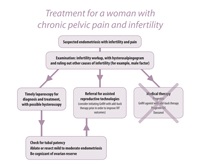Infertility
If you have endometriosis, it may be more difficult to become pregnant. But the good news is that many women with endometriosis are able to conceive — it may just take longer.
Endometriosis is only found in five per cent of fertile women — but its prevalence in infertile women ranges from 25 to 50 per cent. Unfortunately, we don't fully understand what causes endometriosis-associated infertility. In women with extensive endometriosis, scarring can result in blocked Fallopian tubes or ineffective egg release by the ovaries. However, this does not explain infertility in women with minimal or mild endometriosis. It is possible that inflammation, immune response may be at the root of the problem.
Treatment of infertility caused by endometriosis involves either surgical removal of endometriotic tissue (for example, with laparoscopy) or assisted reproductive technology. Despite lots of research, we don't fully understand the association between endometriosis and infertility. Sometimes surgery or assisted reproductive technology can help women conceive, but these are not always effective.
Treatment for a woman with chronic pelvic pain and infertility

Laparoscopy
During laparoscopy, a health-care professional can remove endometriotic growth and scarring, restoring your normal anatomy to give egg and sperm a better chance of connecting.
If you are having difficulty getting pregnant, and you have symptoms of endometriosis, your health-care professional may recommend laparoscopy to increase your chances of conceiving. Even if you do not seem to have symptoms of endometriosis, laparoscopy might be recommended if your health-care professional finds signs of endometriosis during your physical exam or an ultrasound (such as tender nodules found during physical exams or abnormal growths seen on imaging tests). If you are having difficulty conceiving, but have no signs or symptoms of endometriosis, your health-care professional can discuss with you whether laparoscopy might still be a good option.
Assisted reproductive technology
Sometimes women with endometriosis need more help to get pregnant. Your health-care professional might refer you to a specialist to explore therapies to enhance your chances of getting pregnant: in vitro fertilization (IVF), ovulation induction, intrauterine insemination (IUI).
Endometriosis.org information on Infertility treatments.
In vitro fertilization
The success rate of in vitro fertilization is slightly lower in patients with endometriosis than in those with other reasons for their infertility. However, IVF can help and your health-care professional may recommend this as a treatment if you have infertility that is associated with endometriosis.
Several studies suggest that women with chronic or advanced endometriosis benefit from treatment with a GnRH agonist before an IVF cycle. This medical therapy can be used for three to six months before an IVF cycle, and may improve your chances of becoming pregnant.

